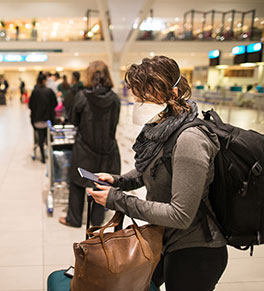Is holiday travel safe in a pandemic?

“During this pandemic, the question isn’t just how to travel, but whether it makes sense to travel at all,” says UCI Health infectious disease expert Dr. Susan Huang.
With Thanksgiving and winter holidays fast approaching and COVID-19 case on the rise across the country, many people are wondering if it’s safe to travel to visit faraway relatives, or even for college students to come home.
Celebrating virtually is the safest thing to do because travel increases your chance of getting and spreading the novel coronavirus, according to the Centers for Disease Control and Prevention (CDC).
Stay home, advises Dr. Susan Huang, medical director of epidemiology and infection prevention for UCI Health. It is the best way to protect yourself and others from the virus.
“During this pandemic, the question isn’t just how to travel but whether it makes sense to travel at all,” Huang says. “Whether or not you travel should be predicated on your assessment of risk.”
Yes, it is possible for friends and families to visit during the holidays, but it will take some serious advance planning to keep everyone safe from COVID-19 in the process, she says.
If you're sick, stay home
The first consideration is obvious and unequivocal: If you are ill, with even mild cold symptoms, you must cancel any plans to visit anyone.
If you or someone in the household you’re planning to visit is at higher for severe complications of COVID-19, you need to be extra careful. Heart disease, lung disease, diabetes, obesity and being over 65 are all risk factors.
For instance, you’d like to visit your elderly grandmother for two days over Thanksgiving and she’s in good health.
Huang suggests eliminating the risk of possibly exposing her to the virus and instead conducting a virtual gathering or multiple gatherings on the holiday. Family members could enjoy virtual sharing or games — all without masks.
In another scenario, someone might plan to visit their grandfather who’s at high risk because of his age, heart disease and diabetes.
Huang recommends taking scrupulous care to avoid places of high exposure for at least two weeks before you visit. Alternatively, you may consider quarantining yourself for 14 days before traveling to your relative's house.
Should I get tested?
It’s not necessary for most people to be tested for the virus before traveling to visit relatives within the United States — unless you have symptoms or have been exposed to the virus.
But what about the college student planning to visit family whose roommate recently had COVID-19? In that case, the student should be tested about seven days after exposure and quarantined for 14 days before traveling to visit anyone for the holidays.
COVID-19 may be the worst virus circulating, but seasonal flu can also cause serious illness, especially in the same high-risk patients.
That’s why it’s important for everyone to get vaccinated. “Get your flu shot before you travel,” Huang advises.
Safety tips for planes, trains and buses
The keys to staying safe using public transportation are the same as those for any public situation: masking, distancing and hand hygiene, says Dr. Shruti Gohil, UCI Health associate medical director of epidemiology and infection prevention.
Consider these scenarios offered by Gohil to grasp what’s needed for safety:
- Eat at the airport: The riskiest time is when you have your mask off. So, instead of buying something to eat on the airplane, arrive a little early and take your purchased food to a less-crowded area within the airport and eat before boarding.
- Mask hygiene: Use hand sanitizer that contains at least 60% alcohol before removing your mask, and after you place the mask in a plastic bag for safekeeping. Use hand sanitizer before you eat or drink, afterward and before putting on your mask.
- Clean your seating area: Use a disinfectant wipe provided by the carrier (or carry your own) to clean your seating area, including the seat belt buckle, armrests, tray table, entertainment screen and remote.
- Bathroom safety: On your walk to the bathroom, you’re likely to touch seat backs, the door handle and other surfaces inside the restroom. Use hand sanitizer before and after.
- Passing items: Use hand sanitizer before and after passing items back and forth between crew members and other passengers.
Is COVID-19 spreading at your destination?
The more cases at your destination, the more likely you are to get infected during travel and spread the virus to others when you return. Consider the recent surge of cases across much of the Midwest and other parts of the country when you are deciding where and whether to travel.
The CDC offers the following resources to check on travel locations before you buy those tickets:
- Check each state’s cases in the last 7 days
- Travel recommendations for destinations around the world
- For the states, local and territorial governments that have additional requirements, check their websites for information.
If COVID-19 cases are on the rise in an area you plan to visit, Gohil recommends traveling at a safer time.




